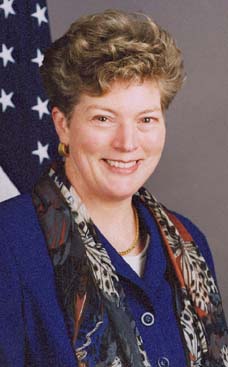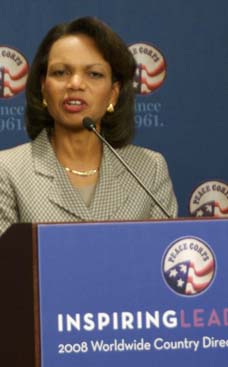
Jeremiah Johnson was flown back to Washington, where he had the medical tests and consultations that accompany the end of anyone’s Peace Corps service. “Even through this awful period, every single Peace Corps person I dealt with was kind and sympathetic,” Johnson says. “That’s something the previous media accounts got wrong.” Back in Washington, he says, one of the organization’s nurses brought him cookies and offered referrals to therapy and support groups. But while Johnson was staying in a Washington hotel, preparing to return to Denver, he began to wonder if he hadn’t been the victim of discrimination. “I’d gone from diagnosis to this dramatic disclosure and its aftermath in just a weeks,” Johnson says. “So many issues were all tangled together—telling my family, telling my friends, the trauma of separation, figuring out how to find care. And then I started to feel angry.” Complicating his decision to fight back: the U.S. Labor Department’s guarantee of free HIV care for the rest of his life, since his contracting HIV was ruled a consequence of having worked in a high-risk environment. “They’ve never threatened to remove [the free medical care] during the case,” he says. “I am amazingly grateful.”
Jeremiah Johnson tells the story of his termination as a PCV in Ukraine after he tested positive for HIV
Service Interruption
by Bob Ickes
Jeremiah Johnson heeded his country’s call to public service by volunteering for the Peace Corps. It sent him to Ukraine to teach English and AIDS prevention. But when he himself became infected there, the Peace Corps dismissed him. After he charged discrimination, and POZ pressed for clarification, the group now says it is committed to accommodating positive volunteers.
Jeremiah Johnson will tell you that he never meant to be an HIV activist, an HIV hero, or a symbol of the daily struggle people living with HIV wage against stigma and discrimination. Nope, says the lanky 25-year-old from Denver: “I’ve never thought of myself as Norma Rae or anything.” But whether he likes it or not, many in the AIDS community and the national media have anointed him. And like many other crusaders since the dawn of the epidemic, Johnson—an
intensely private, reflective young man—has had the cause thrust upon him. Indeed, the events that led to his contracting HIV and his related termination from the Peace Corps this past February—and his legal skirmish with the organization over that dismissal, which he alleges is a case of HIV discrimination—sprang from a rather simple decision: He wanted a few beers.
One evening in August 2007, Johnson, who had by that time served 11 months of his 27-month Peace Corps term in Ukraine, hopped a train in his home base of Rozdilna (rose-DIL-nuh), a bleak town of 17,000. His destination: the party capital of Odessa, about 90 minutes away on the vodka-soaked shores of the Black Sea. On that night he would intersect with the various cultural forces that fuel HIV in Ukraine—and choose the very behavior that his Peace Corps work had taught others to avoid: unprotected sex, in the back room of a gay club.
“I’d had a hard week,” says Johnson, who stands 6-foot-2, has a thing for pro hockey players and prefers “Jeremiah” to “Jeremy” because he thinks it conveys seriousness and authority. (As does, he believes, his beard, which he cultivated in Ukraine.) “There are gay clubs in Odessa, and I wanted to just hang out and socialize. Life in Rozdilna is not an easy one.” And then, in the earnest tone of someone who has dedicated his life to public service, he adds: “But I loved it. It was so rewarding. I would get up at five every morning, do my wash by hand, get my lesson plans ready for the English classes I was teaching, then sometimes prep for my secondary Peace Corps projects with HIV.” (He helped launch, among other HIV initiatives, an educational road show that taught Ukrainian kids about the virus, and a program that helped underground gay groups get funding for prevention efforts.) Johnson would walk to the secondary school where he taught many classes a day, often meeting afterward with other volunteers and activists fighting Ukraine’s crippling HIV stigma. (Its rate of new infections is exploding, the highest such percentage outside Africa, with 80 percent of new Ukrainian infections occurring among Johnson’s age group, 20–39.) He’d then return to his spare Rozdilna bedroom, often dine alone, read a bit, call friends back in America for moral support and conk out.
During his first month in the village, Johnson lived with a host family, who had a cramped house that afforded him little privacy. Although Johnson has been openly gay since he was 21 and disclosed his sexual orientation upon applying to the Peace Corps, he guarded it in Ukraine, fearing personal and professional repercussions. Gay stigma in Ukraine often turns violent—as it does in many other HIV-ravaged nations, such as Jamaica—keeping many men and women from coming forward for HIV education and treatment. The stigma also forces gay sexuality into the shadows, increasing the sorts of unprotected behaviors that heighten transmission risk.
Johnson, the only American teaching at the Rozdilna Educational Complex Gymnasium No. 1, wanted to avoid any extra attention that could distract him and his students from their work. “But being so guarded, of course, kept me from being intimate or physical with anyone for a very long time in Ukraine,” he says. “That part of me went entirely neglected. I couldn’t exactly pursue my sexuality while living with another family. And in our Peace Corps training, we were taught a lot about the high HIV rates in Ukraine and discouraged from any sort of casual sex with people in the country.”
Johnson eventually moved into a house of his own in Rozdilna, but what he gained in privacy he sacrificed in loneliness. He was the sole Peace Corps volunteer in town. “I was lonely in that house all by myself,” he says. “I was far from home, isolated, cut off from my own sexuality. They teach you so much in the Peace Corps, and they prepare you for that isolation, but until you experience it, you just don’t know. I mean, you have all your work to power you through it, you can feel noble, but the solitude can still get to you.”
And so it was that Jeremiah Johnson found himself on a train to Odessa that August evening. There he met up with some other American Peace Corps volunteers from the region, leaving them eventually to wander around. “I went to a club and started talking with this nice guy,” he says. “And I’d had a few drinks. He was handsome, we went into the back room, and he was insistent on not using a condom. People ask me, ‘With all the prevention work you’ve done in America and in Ukraine, how could you possibly have agreed to that?’ And the simple answer, I guess, is that I’m human. This is a human virus. I made a mistake. I’d once been seriously involved with an HIV-positive man back in America, and we were careful, and I always got tested, and I’d always been negative. Every HIV test I ever took, I was always negative. And so I guess I just figured I would be after this [experience] too.”
Five months later, in January 2008, Johnson was summoned to the national capital of Kiev for a standard medical exam. “The doctors there are always very friendly and nice,” Johnson says. But the news they delivered wasn’t: He had tested positive for HIV. “It was January 11,” Johnson says. “It’s a day you don’t forget. I’m pretty sure it had to have come from that one night in the bar with that one guy. I had had only one other encounter, which was absolutely safe.”
His blood sample was sent to Washington for confirmation, and Johnson was told to gather his belongings and prepare to leave, just in case. “The biggest thing on my mind then was not necessarily my health,” Johnson says. “I knew I could still have a healthy life if positive. My biggest concern was whether I could still serve in the Peace Corps and teach my kids.”
Three weeks later, Washington confirmed the results. And, no, he could no longer serve in the Peace Corps. Johnson was told he had a medical condition that had not, in Peace Corps parlance, “resolved” within the organization’s allotted 45 days. He would be “medically separated” from the organization, with no option to return. Johnson says a Peace Corps official said that Ukrainian law forbids HIV-positive foreigners from living in the country. Yet when Johnson’s attorney inspected the language of the statute, they found that though it bars HIV-positive foreigners from applying for a work visa, it makes no provision for those who already have a visa upon testing positive. Johnson was handed a document that read,
“Dear Jeremiah Johnson, your current medical condition has not resolved. This condition limits your ability to perform your Volunteer assignment and has the very real potential for further aggravation during the remainder of your Peace Corps service. After serious consideration and consultation with the Office of Medical Services, Peace Corps/Washington (OMS), we do not feel that you can safely continue to serve as a PCV in the Ukraine...”
Johnson was asked to sign the paper, and he did. Devastated, he asked for a few extra days to say goodbye to his colleagues at the school, where he had become a student favorite for his novel teaching methods, which included poetry and writing games. “We just couldn’t tell the kids why I was leaving,” he says. “I’m a bad liar, so I decided that we’d tell them and the other teachers that I’d had ‘some bad blood work,’ which is basically true.”
He was flown back to Washington, where he had the medical tests and consultations that accompany the end of anyone’s Peace Corps service. “Even through this awful period, every single Peace Corps person I dealt with was kind and sympathetic,” Johnson says. “That’s something the previous media accounts got wrong.” Back in Washington, he says, one of the organization’s nurses brought him cookies and offered referrals to therapy and support groups.
But while Johnson was staying in a Washington hotel, preparing to return to Denver, he began to wonder if he hadn’t been the victim of discrimination. “I’d gone from diagnosis to this dramatic disclosure and its aftermath in just a weeks,” Johnson says. “So many issues were all tangled together—telling my family, telling my friends, the trauma of separation, figuring out how to find care. And then I started to feel angry.”
Complicating his decision to fight back: the U.S. Labor Department’s guarantee of free HIV care for the rest of his life, since his contracting HIV was ruled a consequence of having worked in a high-risk environment. “They’ve never threatened to remove [the free medical care] during the case,” he says. “I am amazingly grateful.”
And yet Johnson pushed onward. Not knowing an AIDS activist organization in Washington or, in fact, the United States, he went online. He found the site of AIDS Action, which referred him to DC’s mighty Whitman-Walker Clinic. And then, not knowing anyone there, he hopped on another train—the Washington Metro subway—and went over to introduce himself. An attorney there immediately suspected that Johnson had a legal case against the Peace Corps and referred him to the American Civil Liberties Union (ACLU) in New York City. Johnson returned to Denver and contacted ACLU staff attorney Rebecca Shore. “It was apparent to us that the Peace Corps’ decision violated the Rehabilitation Act,” says Shore. “It holds that any agency receiving federal funds can’t discriminate on the basis of disability, and that reasonable accommodations must be made on an individual basis.” For Johnson, such accommodation might include reassignment to a less rigorous locale or to an area with advanced care.
It didn’t help the Peace Corps’ case that as Johnson was returning to America in February, the United States Foreign Service amended its policy of banning HIV-positive employees. The decision sprang from a 2006 U.S. appellate court ruling in the case of Lorenzo Taylor, a positive Foreign Service applicant who was rejected when he disclosed his serostatus.
“We sent a letter to the Peace Corps director,” says Shore. “We asked for reassurances that this policy be changed. We hoped that the case would not come to legal action, that reasonable minds would prevail.” As the story unfurled in the national and international media, the Peace Corps was resolute in its defense of its medical separation policy, saying it focused not on HIV but any condition that could not “resolve” in 45 days.
The Peace Corps further hampered its defense when it declared that it believed Johnson to be the first volunteer to be diagnosed with HIV. In the May 16 edition of the Washington Post, however, reporter Stephen Barr, who has championed Johnson’s case in a series of articles and essays, revealed that of the 75,000 Americans who have joined the Peace Corps since 1989, 36 have tested positive either during or at the conclusion of their overseas tours—which Peace Corps press director Amanda Beck confirmed. One of those volunteers was Rebecca Coulborn, who contracted HIV through blood-to-blood contact as a health volunteer in the African nation of Burkina Faso. “Eight years ago,” she wrote on the website of the National Peace Corps Association—a posting that got the attention of U.S. Senator Christopher Dodd, whose office began lobbying on Johnson’s behalf—“I tested positive for HIV and was medically separated from the Peace Corps.... I believe this is the result of antiquated policies...based on fear and prejudice. If you [contract] TB or malaria you receive treatment, but if you test positive for HIV you are sent home. I love the Peace Corps, but to date...[the shock of] receiving my diagnosis still pales in comparison to being sent home.” She told POZ, “[The] Peace Corps can do better than this.”
Demonstrating the self-stigmatization that can lead many living with HIV to feel shameful and further marginalized, Johnson says, “Sometimes I think Rebecca is a better poster child than I am, because she contracted HIV on the job, through blood-to-blood contact.” But he is in no way disappointed in himself and believes that he is even more suited now to educate others about HIV. “That’s what I don’t get about this termination decision,” Johnson says. “Firsthand experience is invaluable. Now some of the HIV programs I helped start in Rozdilna have stopped.” Yet Johnson doesn’t want to be reinstated in the Peace Corps: “I’m settled in Denver. But I want this separation policy clarified, to save others the stress I went through.”
Johnson may have pushed the Peace Corps toward just such a clarification. As POZ went to press in early June, the Peace Corps’ Beck responded to our request for a definitive update on the case. Via e-mail, she wrote:
“Although there are certainly significant challenges associated with properly supporting Peace Corps Volunteers overseas who are HIV positive, our commitment to accommodation of HIV-positive applicants and Volunteers where reasonable and possible is firm. If qualified applicants and qualified Volunteers can be reasonably accommodated without placing an undue burden on
the agency, they will not be medically disqualified, or medically separated from service, as the case may be.”
It’s the most encouraging sign yet that Johnson’s advocacy could have an enduring result. Meanwhile, he serves people in a new setting: a restaurant. “FOXnews.com ran a story mentioning I worked in a restaurant,” he says, “and someone posted a comment that I shouldn’t be allowed to do that either, because I’m a safety threat. Education is needed everywhere.”
He says he has been “somewhat depressed” since returning to Colorado. “I have a hard time getting my energy up, connecting with friends, that kind of thing.” He has his memories of Ukraine, and his students, to sustain him. “I do think I was getting through to them,” he says. “They were learning to speak and write English.” How can he be sure? “When I left they wrote me notes and drew me pictures.” One, he says, was of a sunset. And there was a sentence, written beneath it, in English. It read: “I will miss you.”










